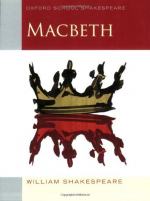|
This section contains 941 words (approx. 4 pages at 300 words per page) |

|
Manhood Personified
Summary: In William Shakespeare's "Macbeth," the image of manhood represents the male stereotype of the period. To be considered "manly," a man needed to be tough, violent, and heartless, and he needed to channel his emotions toward masculine thoughts, which meant concentrating on violent acts. This portrait is exemplified through Malcolm's reaction to Macduff's emotional outburst in Act IV, as well as through Lady Macbeth's contention that Macbeth would be considered weak and cowardly if he did not murder King Duncan.
Being a man in today's society is flexible and free. A man can be who he wants, where he wants, whenever he wants. In Shakespearean times, being a man had its challengers because of the stereotypical viewpoints of those in the rural society. Being considered `manly' meant one had to have certain traits that would indefinitely define him as a real man. A man had to be cruel, violent, and heartless but at the same time be able to relate to their emotional selves and transfer any passion into a cruel manner. Situations in the play Macbeth suggest Shakespeare's image at what a real man is although it is always one character remind the character in doubt to remain a man. In one circumstance, Malcolm reacts to Macduff's emotional outburst in the bizarre stereotypical manner in which most characters are driven throughout the play. The way Lady Macbeth...
|
This section contains 941 words (approx. 4 pages at 300 words per page) |

|


